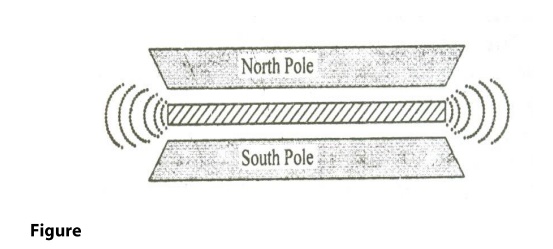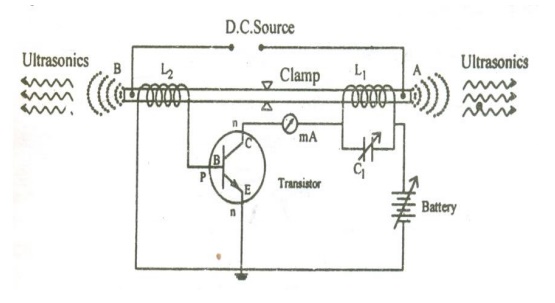Chapter: Physics : Acoustics and Ultrasonics
Properties and Production of Ultrasonic waves
Properties of Ultrasonic waves
The
human ear is sensitive to sound waves in the frequency range from 20-20, 000
Hz. This range is called Auduble range. Sound waves of frequency more than
20,000Hz are called Ultrasonics. These frequencies are beyond the audible
limit.
These
waves also travel with the speed of sound(330m/s)
Their
wavelength are small.
Production of Ultrasonic waves
Principle:
When a rod of ferromagnetic material like nickel is magnetized. Longitudinally,
it undergoes a very small change in length. This is called Magnetostriction
effect.

Construction:
The
circuit diagram of magnetostriction ultrasonic generator is as shown in the
figure1.3.2. A short permanently magnetized nickel rod is clamped in the middle
between two knife edges. A coil L1 is wound on the right hand
portion of the rod. C is a variable capacitor. L1 and C1
form the resonant circuit of the collector-tuned oscillator. Coil L2
wound on the LHS of the rod is connected in the base circuit. The coil L2
is used as a feed back loop.

Working:
When
the battery is switched on, the resonant circuit L1C1
sets up an alternating current o frequency.

This
current lowing round the coil L1 produces an alternating magnetic iels of
frequency f along the length of the nickel rod. The rod starts vibrating due to
magnetostrictive effect. The vibrations of the rod create ultrasonic waves.
The
longitudinal expansion and contraction of the rod produces an E.M. in the coil
L2. This e.m.f is applied to the base of the transistor. Hence the
amplitude of high frequency of high oscillations in coil L1 is increased due to
positive feedback.
The
developed alternating current frequency can be turned with the natural
frequency of the rod by adjusting the capacitor.
Condition for Resonance:
Frequency of the oscillator circuit
= Frequency of the vibrating rod

Where
‘l’ is the length o the rod
‘E’
is the Young’s modulus o the rod
‘ρ’
is the density of the material of the rod.
The
resonance condition is indicated by the rise in the collector current shown in
the milliammeter.
Advantages:
Magnetostriction
Oscillators are mechanically rugged.
The
construction cost is low.
They
are capable of producing large acoustical power with fairly good efficiency.
Limitations
It
can produce frequencies up to 3MHz only.
They
frequency o oscillation depends upon the temperature.
Breadth
o the resonance curve is large. It is due to vibrations of elastic constants of
ferromagnetic material with the degree of magnetization. So we cannot get a
constant single frequency.
Related Topics